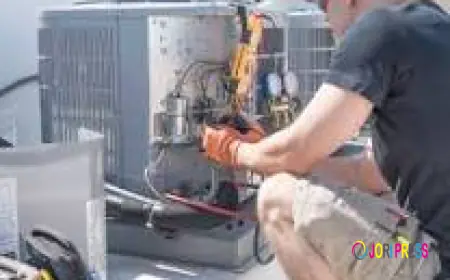Building a Crypto Exchange with Smart Contracts: A 2025 Startup Guide
Learn how to launch a crypto exchange in 2025 using smart contract technology. This in-depth guide explores development services, compliance, architecture, and choosing the right smart contract development company.

As the global demand for decentralized finance (DeFi) solutions intensifies in 2025, building a crypto exchange has emerged as one of the most lucrative startup opportunities. The evolution of blockchain and the mainstream acceptance of digital assets have set the stage for a new era of financial innovation. At the heart of this movement are smart contracts, which enable automated, trustless, and transparent transactions on the blockchain.
Startups looking to launch a crypto exchange must understand not only the technical architecture and regulatory landscape but also the pivotal role of smart contract development companies. These firms provide the specialized expertise necessary to design secure, scalable, and compliant platforms that can handle real-world trading activity.
This guide dives deep into the process of building a crypto exchange using smart contracts. It highlights the importance of smart contract development services, explores the technical underpinnings of decentralized exchanges (DEXs) and centralized exchanges (CEXs), and offers insight into key considerations for 2025 and beyond.
Understanding Smart Contracts in Crypto Exchanges
Smart contracts are self-executing pieces of code that live on the blockchain. They automate the logic of transactions, ensuring that terms are enforced without the need for intermediaries. In the context of crypto exchanges, smart contracts govern everything from trade execution and order matching to liquidity pools, token swaps, and governance mechanisms.
Smart contracts can power fully decentralized exchanges, where users retain custody of their assets and interact with the platform through non-custodial wallets. They can also be used in hybrid models, where centralized components are augmented with decentralized, on-chain settlement systems.
In 2025, smart contracts have evolved significantly. They now support advanced functionalities such as flash loans, cross-chain bridging, real-time asset pricing via oracles, and programmable liquidity mechanisms. As a result, building a competitive exchange today requires a sophisticated understanding of smart contract architecture and its potential.
Choosing Between a DEX and CEX Model
One of the first decisions a startup must make is whether to build a decentralized exchange (DEX), a centralized exchange (CEX), or a hybrid platform. Each model comes with its own set of technical, legal, and operational considerations.
A DEX relies entirely on smart contracts for core functionalities. Users interact directly with the blockchain, making the exchange non-custodial and censorship-resistant. Liquidity provision is handled through automated market makers (AMMs) or decentralized order books. However, building a DEX requires expertise in gas optimization, cross-chain communication, and user experience design within decentralized interfaces.
A CEX, on the other hand, operates with centralized custody, matching engines, and databases, but can incorporate smart contracts for settlements, token issuance, or compliance automation. This model allows for higher throughput and more robust customer support, but comes with greater regulatory and custodial responsibilities.
Hybrid models aim to combine the best of both worlds. They use smart contracts for on-chain settlements while retaining a centralized user interface and support system. In all cases, engaging a smart contract development company is essential to implement secure and efficient contract logic.
The Role of Smart Contract Development Companies
Smart contract development companies provide the technical foundation for a successful crypto exchange. They offer services that include architecture design, contract coding, auditing, deployment, and maintenance.
In 2025, these companies have matured into full-service providers that understand the specific needs of exchanges. They help startups navigate regulatory requirements, integrate third-party services such as oracles and liquidity aggregators, and ensure that the platform is optimized for performance and security.
Key areas of contribution from smart contract developers include protocol design, token economics, governance structures, staking mechanisms, compliance automation, and scalability solutions.
Partnering with a reputable development firm also reduces time-to-market, ensures that the exchange is compatible with multiple chains, and provides ongoing support for upgrades and bug fixes.
Smart Contract Development Services for Exchange Startups
The range of smart contract development services available in 2025 is extensive and tailored to the needs of startups entering the crypto exchange space. These services go far beyond basic coding and encompass end-to-end technical and strategic guidance.
Architecture and Planning involve defining the technical structure of the exchange, including contract modularity, upgradability, data storage, and execution logic. This stage is critical for ensuring flexibility and maintainability.
Contract Development includes writing the core logic for trading, asset custody, fee calculation, and more. Smart contracts must be gas-efficient, secure, and compatible with target blockchains such as Ethereum, BNB Chain, Solana, or emerging Layer 2 networks.
Security Audits and Testing are non-negotiable. All contracts must undergo rigorous testing to identify and eliminate vulnerabilities. Formal verification, static analysis, and penetration testing are standard practices.
Integration and Deployment cover connecting the smart contracts to front-end interfaces, APIs, wallets, and third-party services like Chainlink for price feeds or The Graph for indexing.
Ongoing Support ensures that the contracts can adapt to changing user needs, market dynamics, or regulatory updates. This may include patching vulnerabilities, upgrading functionality, or adding new features.
Technical Considerations When Building the Exchange
A crypto exchange built on smart contracts must address several technical challenges to succeed in the competitive landscape of 2025.
Interoperability is essential. Users demand the ability to trade assets across multiple chains. Smart contracts must support cross-chain swaps or connect to bridging protocols that allow seamless asset transfers.
Scalability remains a top priority. Layer 2 solutions such as Optimistic Rollups, zk-Rollups, and sidechains offer relief from high gas fees and limited throughput on Layer 1 networks. A robust exchange must integrate these solutions to remain cost-effective and user-friendly.
Security is paramount. A single vulnerability can result in the loss of millions of dollars and irreparable damage to a startup's reputation. Regular audits, bug bounty programs, and secure development practices are essential.
User Experience must not be overlooked. Even the most advanced smart contract system will fail without an intuitive interface. UX/UI design, fast transaction confirmation times, and clear communication of on-chain actions contribute to platform success.
Regulatory and Compliance Requirements
In 2025, the regulatory landscape for crypto exchanges continues to evolve. Jurisdictions around the world are introducing clearer frameworks for token listing, anti-money laundering (AML), know-your-customer (KYC) procedures, and tax reporting.
Smart contracts can assist in compliance by automating identity verification, implementing transaction limits, or flagging suspicious behavior. Development companies that specialize in regulatory tech can design contracts that align with legal standards while preserving decentralization where appropriate.
Engaging with legal counsel during the planning stage is crucial. Development firms often collaborate with law firms to ensure that smart contracts are built with compliance in mind.
Launching and Scaling the Exchange
The launch phase involves extensive coordination between technical, marketing, and compliance teams. Testnet deployment, community testing, beta programs, and security audits must be completed before mainnet launch.
Smart contract developers assist with setting up liquidity pools, onboarding initial token pairs, integrating with aggregators, and optimizing contract performance. Incentive programs such as yield farming or trading co
mpetitions may be hardcoded into the launch contracts.
Post-launch, scaling becomes the focus. This includes expanding to new blockchains, adding more trading pairs, improving contract efficiency, and refining governance mechanisms.
Marketing and user acquisition are supported by the credibility and performance of the smart contract infrastructure. Downtime or hacks can derail growth, while reliable contracts help build trust and attract institutional interest.
Conclusion
Building a crypto exchange in 2025 presents a unique opportunity for startups to capitalize on a maturing market. Smart contracts are the backbone of this new financial paradigm, enabling secure, automated, and transparent transactions across decentralized networks.
Partnering with an experienced smart contract development company is essential to navigate the complex technical, regulatory, and operational challenges involved. These firms provide comprehensive services that support every phase of exchange development, from planning and coding to deployment and scaling.
With the right strategy, technology stack, and development partner, startups can create innovative and resilient crypto exchanges that stand out in a crowded market. The future of finance is decentralized, and smart contracts are the keys that unlock its full potential.
What's Your Reaction?
 Like
0
Like
0
 Dislike
0
Dislike
0
 Love
0
Love
0
 Funny
0
Funny
0
 Angry
0
Angry
0
 Sad
0
Sad
0
 Wow
0
Wow
0
















































